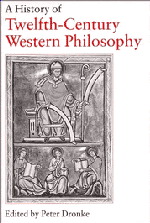Book contents
- Frontmatter
- Contents
- Preface
- Contributors
- List of abbreviations
- Introduction
- I Background
- II New Perspectives
- 5 Scientific speculations
- 6 Speculative grammar
- 7 Logic (i): from the late eleventh century to the time of Abelard
- 8 Logic (ii): the later twelfth century
- III Innovators
- IV The Entry of the ‘New’ Aristotle
- Bio-bibliographies
- General Bibliography
- Index of Manuscripts
- General Index
8 - Logic (ii): the later twelfth century
Published online by Cambridge University Press: 01 June 2011
- Frontmatter
- Contents
- Preface
- Contributors
- List of abbreviations
- Introduction
- I Background
- II New Perspectives
- 5 Scientific speculations
- 6 Speculative grammar
- 7 Logic (i): from the late eleventh century to the time of Abelard
- 8 Logic (ii): the later twelfth century
- III Innovators
- IV The Entry of the ‘New’ Aristotle
- Bio-bibliographies
- General Bibliography
- Index of Manuscripts
- General Index
Summary
John of Salisbury as witness: was there a degeneration of logic in the second half of the twelfth century?
John of Salisbury's Metalogicon, which was written in 1159, is commonly held to be an important narrative source for the history of logic in the first half of the twelfth century. Between 1136 and 1147 John studied logic, grammar, and theology at various schools in Paris and, in all probability, also in Chartres. His work ‘On Logic’ is rich in vivid descriptions of his teachers, their idiosyncrasies, and their teaching methods.
We propose to use this work as a starting-point for an account of the characteristic features of the history of logic in the second half of the century. At the time when he wrote the Metalogicon John had been employed for ten years (from 1147) as secretary to Theobald, the Archbishop of Canterbury. In this capacity he devoted himself to legal affairs and he was also frequently entrusted with diplomatic missions. He had not concerned himself with logic since his student days, and even now he had no leisure for such matters: his duties left him scarcely any free time. Even though he took pleasure in recalling his life as a student, writing a book on logic was, on the whole, a chore which he undertook only because he felt compelled to do so.
- Type
- Chapter
- Information
- A History of Twelfth-Century Western Philosophy , pp. 227 - 252Publisher: Cambridge University PressPrint publication year: 1988
- 1
- Cited by



